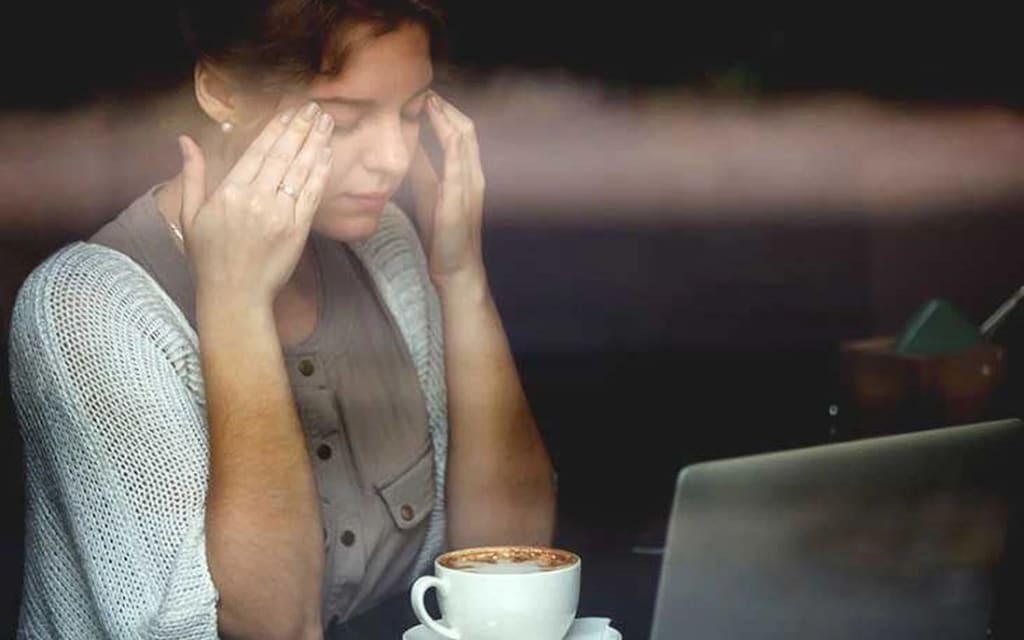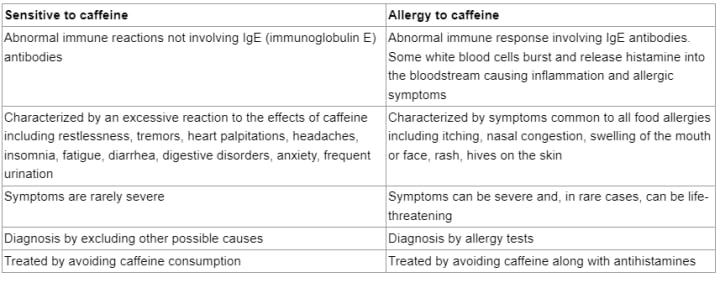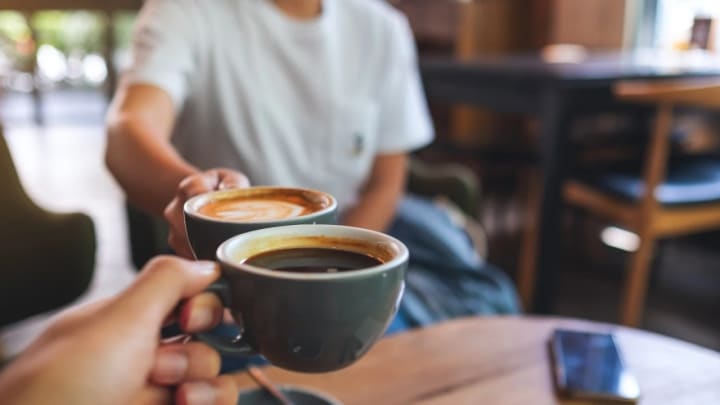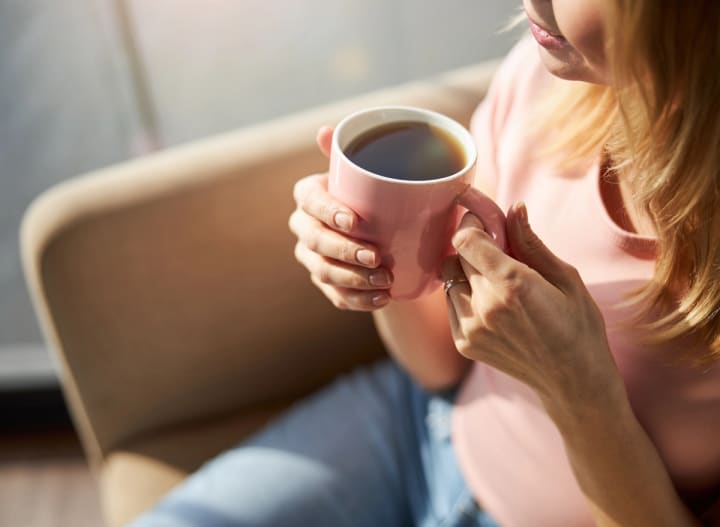What to do when you get drunk on coffee? Is coffee drunk dangerous?
Caffeine stimulates the central nervous system, making coffee drinkers more alert and energizing the body. However, some people are more sensitive to caffeine and get drunk when drinking coffee.

Caffeine stimulates the central nervous system, making coffee drinkers more alert and energizing the body. However, some people are more sensitive to caffeine and get drunk when drinking coffee.
People who are sensitive to caffeine or drink too much coffee or drink it at the wrong time often experience serious or less serious effects when drinking coffee and are commonly called coffee intoxication with symptoms such as: headaches, diarrhea, restlessness, dizziness or difficulty sleeping, or even vomiting or insomnia.
Caffeine sensitivity is different from caffeine allergy (a problem caused by a specific immune response to caffeine) but both share similar symptoms.
1. Levels of sensitivity to caffeine
To understand what coffee intoxication is, you need to know that different people will react differently when consuming caffeine due to different tolerance levels. While a person can comfortably drink 3 - 4 cups of coffee a day, there are people who cannot drink even a small sip.

While there is no specific test to measure caffeine sensitivity, there are three basic levels based on how your body metabolizes the caffeine you consume, as follows:
- Normal level of sensitivity
Most people can fall into the normal range of caffeine sensitivity. This means you can consume about 200 - 400 milligrams (mg) of caffeine without experiencing negative side effects, unless you consume more. 400 mg of caffeine per day is also the limit amount of caffeine according to the FDA for healthy adults.
- Low sensitivity
Many people have low caffeine sensitivity, meaning they can consume higher levels of caffeine (500 mg or more) without experiencing unwanted side effects, and this group may even be able to Drink caffeine before bed without interrupting your sleep. However, this group can become addicted to caffeine and have difficulty staying awake or concentrating if they do not drink enough caffeine.
For the low sensitivity group, the body metabolizes caffeine quickly. According to Very Well Health, one study estimates that about 10% of the population carries a gene associated with low caffeine sensitivity.
- High sensitivity (hypersensitivity)
People with high caffeine sensitivity, also known as hypersensitivity reactions to caffeine consumption, occur due to the ability to metabolize caffeine more slowly and are at risk of experiencing severe effects (reactions) with just a small amount. With a small amount of caffeine (less than 100 mg), the time caffeine stays in their blood can last twice as long as normal people. Common symptoms are usually:
+ Insomnia
+ Fast heartbeat
+ Restless
+ Headache
+ Nausea
+ Diarrhea
+ Difficulty sleeping.
2. Distinguishing between caffeine sensitivity and caffeine allergy
As mentioned above, the symptoms of caffeine sensitivity and allergy are similar and can be confusing. Here are some characteristics that can help you differentiate between the two conditions:


3. Causes of sensitivity to caffeine
There are many factors that can make you more susceptible to coffee intoxication and more sensitive to caffeine than other groups, including gender, age and weight. Other causes include:
- Liver metabolism
Caffeine is metabolized (broken down) in the liver by an enzyme (protein) called CYP1A2. The gene associated with this enzyme helps predetermine a person's sensitivity to caffeine consumption. Studies have found that people with high caffeine sensitivity do not produce as much CYP1A2.
- Medicine
Certain medications and herbal supplements can increase the effects of caffeine on the body, including the medication theophylline (an asthma medication) and herbal supplements containing ephedrine and echinacea.
- Genetic
According to Healthline, many studies have shown that a person’s genetic makeup has a lot to do with how they react to caffeine. In addition to the CYP1A2 gene, which affects how quickly the liver breaks down caffeine, another gene called ADORA2A affects how the central nervous system (the communication between the brain and the body) responds to the stimulating effects of caffeine. People with the ADORA2A gene variant are more likely to be sensitive to caffeine, which also affects their sleep.
- The danger elements
Caffeine sensitivity also varies greatly depending on each person's physical condition, but in general there are a number of risk factors that can make a person more sensitive to caffeine, including: older age, female gender. , have chronic health conditions, have a smoking habit, are pregnant women, children, adolescents, and are using oral contraceptives.

4. What to do when you get drunk on coffee?
A coffee hangover is not a pleasant feeling and you always want to find a way to get rid of this condition as soon as possible. Here are some things you can do to reduce the unpleasant feeling caused by a coffee hangover.
- Drink a lot of water
Drinking more water helps to flush caffeine out of your body more quickly through your urine, and it also helps to prevent dehydration, another “diuretic” effect of coffee. Drinking more water also helps to reduce fatigue and irritability for the next 1-2 hours.
The amount of water you should drink is from 500 ml to 1 liter of water depending on your ability after discovering you are drunk on coffee.
- Rest
When you are drunk from coffee, it is best to rest in place to avoid unwanted accidents caused by symptoms of coffee hangover, such as dizziness, lightheadedness or headaches. Proper rest also gives your heart rate time to stabilize.
- Starch
Eating more carbohydrates is one way to help reduce mild caffeine hangovers. Foods rich in carbohydrates include bread, rice, cereals, and crackers. Many people have reported that the stomach upset or migraines caused by caffeine hangovers are relieved after eating carbohydrates.

- Deep breath
You may experience increased nervousness, including jitteriness, if you have a caffeine hangover. Deep breathing can help alleviate these symptoms. Start by inhaling through your nose for about 4 seconds and holding it in your chest for about 7 seconds. Then exhale slowly through your mouth and hold it for 8 seconds. Repeat this deep breathing exercise to reduce the feeling of nervousness or rapid heartbeat when you have a caffeine hangover.
- Gentle exercise
If your body condition allows, try light exercise to help your body "consume" some of the energy that caffeine brings, this also contributes to increasing metabolic rate as well as supporting faster caffeine elimination.
In addition to the above measures to help reduce coffee intoxication, you should also eat foods rich in vitamins and minerals such as vitamin C, zinc, magnesium (bananas, orange juice, etc.) to support your health. However, absolutely do not drink tea to reduce coffee intoxication because tea can contain caffeine and make coffee intoxication worse.
In short, in principle, if you are sensitive to caffeine, it is best to avoid consuming foods and drinks containing caffeine and for people with normal sensitivity, limit the amount of caffeine consumed. more than 400 mg per day and do not take it before going to bed. In addition, lower-caffeine options based on coffee beans such as arabica or thinner drinks (Americano coffee) also help reduce caffeine intake if you still want to drink coffee when you are sensitive to caffeine.
About the Creator
HK Decor
Telling stories my heart needs to tell <3 life is a journey, not a competition
If you like what you read, feel free to leave a tip,I would love some feedback
https://sites.google.com/view/hk-decor/trang-ch%E1%BB%A7
Enjoyed the story? Support the Creator.
Subscribe for free to receive all their stories in your feed. You could also pledge your support or give them a one-off tip, letting them know you appreciate their work.






Comments
There are no comments for this story
Be the first to respond and start the conversation.